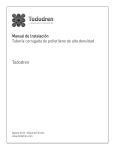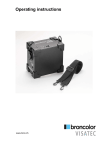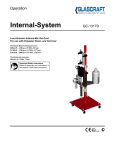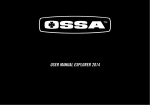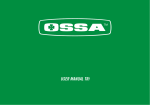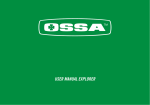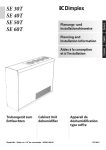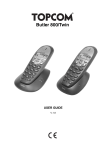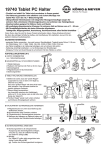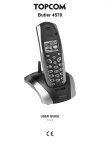Download Operating Instructions LEO 23 GT
Transcript
Operating Instructions for Aerial Work Platform LEO 23 GT Machine no. 140671 Technical specifications are subject to change without notification TEUPEN Maschinenbaugesellschaft mbH Place of business: Marie-Curie-Strasse 13 - D 48599 Gronau - Telephone 02562 / 8161-0 - Telefax 02562 / 8161-888 Postal address: Postfach 1951 - D 48580 Gronau Internet: http://www.teupen.info - E-mail: [email protected] Copyright! The copyright relating to these operating instructions remains with TEUPEN Maschinenbaugesellschaft mbH These operating instructions are intended for use by the owner of the machine and their staff only. The owner of the machine may copy these operating instructions for internal purposes only. 11.04.08 TEUPEN Maschinenbaugesellschaft mbH Table of Contents 3 Contents 1. Introduction 1.1 Proper use 1.2 Explanation of symbols used Page 5-6 Page 6 Page 7 2. Safety instructions and warnings Page 8-12 3. Particular features 3.1 Technical data 3.2 Position of control elements Page 13-14 Page 15-18 Page 19-21 4. Electrical power supply Page 22-24 5. The hydr. rubber chain running gear 5.1 Driving by means of the hydr. rubber chain drive 5.2 Adjusting the height of the chain running gears Page 25-26 Page 27 Page 28-29 4 Table of Contents 6. The support system 6.1 Bringing the machine in working position 6.2 Bringing the machine in transport position Page 30-31 Page 32 Page 33 7. Operation of aerial work platform 7.1 Ground control 7.2 Emergency control platform/chassis Page 34-35 Page 36-37 Page 38-39 8. General maintenance instructions 8.1 Lubrication plan 8.2 Oil recommendation 8.3 Oil levels 8.4 Maintenance instructions for live ring, general Page 40 Page 40-41 Page 42-43 Page 44-45 Page 46-49 9. Faults, causes and repair Page 50-55 10. Disposal Page 56 Introduction 5 1. Introduction The purpose of these operating instructions is to provide the owner of the Aerial Work Platform with information on the correct handling, use and maintenance of the machine. In order to ensure a proper and safe operation of the aerial work platform, please read these operating instructions carefully and follow the instructions given in these operating instructions strictly. These operating instructions contain important information on how to operate the aerial work platform in a safe, proper and efficient manner. Comply with these instructions strictly to avoid hazards, reduce repair costs and downtimes and to increase the service life of the aerial work platform. This aerial work platform complies with „BGG 945“ of the "Hauptverband der gewerblichen Berufsgenossenschaften" and is manufactured in accordance with EN 280 "Mobile Elevation Platforms - Design Calculations and Stability Criteria". In the case of plants which must be approved by official authorities, the owner must have the machine inspected by accredited inspection authorities (TÜV/DEKRA) or authorized persons prior to first commissioning as well as at the specified inspection intervals. Other national or international standards are not applied. Inspections according to other standards must be carried out separately. 6 Introduction and Proper Use In case structural or other modifications are carried out at the machine without the manufacturer's express approval, the EU Declaration of Conformity shall become invalid. 1.1 Proper Use: The machine may only be used for the transport of persons and tools (up to the permissible carrying capacity) to enable work at aerial locations (see technical data sheet). Any other use exceeding the scope of use mentioned above shall be considered as an improper use. Teupen Maschinenbau GmbH shall not be held liable for any damage resulting from such an improper use. Proper use also includes in particular • the compliance with all information given in the operating instructions • the proper performance of the specified inspection and maintenance work As we do our best to always keep our product up to date, we reserve the right to modify and upgrade our aerial work platforms at any time without notification. Symbols Used 7 1.2 Symbols Used: Two symbols are used in these operating instructions for highlighting important information: Warning This symbol indicates information the non-compliance with which may result in serious injuries or even death. Fig. 1 CAUTION This symbol indicates information, the non-compliance with which may result in the machine being damaged 8 Safety Instructions and Warnings 2. Safety Instructions and Warnings! The machine is produced according to the state of the art and the generally recognized safety regulations. However, the use of the machine involves certain hazards which may result in serious injuries or even death as well as material damage of the machine or other property. The machine may only be used • for the specified purpose • when it is in a perfect technical condition, in particular as regards the safety equipment. Any defects affecting the safety must be repaired immediately. Safety Instructions and Warnings Before commissioning the aerial work platform, please read these operating instructions carefully and comply with the following safety instructions and warnings. Any non-compliance with these instructions and warnings may result in serious personal and material damage. In addition to these operating instructions, also comply with the enclosed operating and maintenance instructions of the manufacturers of the motor and the chain running gear. Safety devices, e.g. limit switches, must not be made ineffective. Screwed joints marked yellow and limit switch fixtures must not be loosened. The valve settings may only be modified by qualified staff. Any non-compliance will result in the warranty becoming null and void. 9 10 Safety Instructions and Warnings αmax. = 14,5° (26 %) αmax. = 14,5° (26 %) βmax. = 17° (30%) βmax. = 14,5° (26%) >>Battery operation only If the machine is used transverse to a slope, nobody may stay downhill of the aerial work platform. It is also dangerous to stay downhill behind the aerial work platform while the machine is moving uphill. In order to prevent the aerial work platform from falling over, it is necessary to let down the support until they almost touch the ground. Fig. 2 Safety Instructions and Warnings 11 400 N Note minimum age! Do not climb on the cage railings! Maximum side force 400 N No vibrations or jerky movements! Fig. 3 12 Safety Instructions and Warnings High Voltage! Danger! Note the flowing traffic! Secure parts projecting in the traffic area! Fig. 4 Immediately stop using the aerial work platform if the wind speed exceeds 12,5 m /sec (wind force 6)! The machine must not be used as a crane, hoist or lateral pull! Technical Data 13 3. Particular Features of the Aerial Work Platform LEO 23 GT • Continuous proportional controls. • Upper and lower arm telescopeable. • Driven via diesel engine or battery • Starting/stopping the diesel engine is possible from the platform. • Sensitive electro-hydraulic distance control for chassis to enable exact positioning. • Width and height of chain running gear adjustable. • Narrow support on one side and narrow support on both sides. • Fuzzy control • Parallel guiding of the work cage by hydrostatic compensation system. • 180°-turning work cage. • Eccentrically suspended work cage has the effect of an accessible cage arm. 14 Technical Data • Ergonomically shaped work cage with access opening. • Installation monitoring. • Covers above electric case and bottom control panel. • Start support transport position lower arm (prevents incorrect landing of the lower arm in transport position). Technical Data 15 3.1 Technical Data LEO 23 GT Working height: Platform height: Lateral reach at 200 kg: Cage load: Size of cage (lxwxh): Turning cage: Length: Minimum passage width: Height: Dead weight: Standard support area (lxw): (middle of support disk) Min. support width (middle of support disk) Max. support disk load per column Area load in standard work position: Turning range standard support: Limited turning range (narrow on both sides): Limited turning range (narrow on one side): Supportable up to ground slope of: Climbing ability (in driving direction): (transverse to driving direction): Driving speed: Energy supply chain: approx. 23.00 m approx. 21.00 m approx. 11.20 m max. 200 kg 1.40 x 0.70 x 1.10 m 180° min. 6.20 m min. 0.98 m min. 1.98 m approx. 3000 kg min. 4,10 x 4,30 m min. 2,30 m ca. 22,4 kN 2 ca. 1,8 kN/m ca. 360° 2 x 15° 192° ca. 26 % ca. 30 % ca. 26 % ca. 1,5 km/h internal 16 Technical Data Beispiele Zugangstechnik Korbdrehen 180░ - Korbanordnung aussermittig Mauernische Fig. 5 Satteldach Mauervorsprung Technical Data 17 Drive motor Kubota Z-602 Water-cooled 2-cylinder 4-stroke diesel engine Volumetric displacement: -1 Max. power at 3600 min : Fuel type: Noise emission: 3 599 cm 12.5 kW (17 PS) Diesel fuel approx. 89 dB (A) Accessories Electric motor EBS 90 L X 4 Rated input voltage: Power consumption: Power: Additional weight: 230 V / 50 Hz 12.9 A 2.2 kW approx. 25 kg Alternative battery drive Rated input voltage of battery charger: Hydraulic unit: Additional weight: 230 V / 50 Hz 48 V / 6 kW approx. 180 kg 18 Fig. 6 Technical Data Position of Control Elements 19 3.2 Position of Control Elements Control panel in work cage with control elements for platform, support and chain functions Turn key switch on the front left of the control panel to "Platform" symbol" Ground control panel with control elements for platform, support and chain functions Turn key switch to "I", turn key switch at work cage to "0" 20 Position of Control Elements Box level for level alignment of the aerial work platform Locking mechanism for supports (wide and narrow), make sure in any case that the supports are locked correctly ! Drive motor case (OPTION) (Fuel refill cutout in lid, filling level indicator on opposite side) Position of Control Elements 21 Hydraulic tank, 230-V connection and control box Manual pumps for emergency control of platform and supports Cable remote control for chain functions with fast/slow change-over (if not used, insert jumper in any case) 22 Electric Power Supply 4. Electric Power Supply Power is supplied either via the local mains network using an extension cable (230 V) or by the mainsindependent drive motor. As an alternative, a battery drive is also possible. If an extension cable is used, connect the plug to the socket of the extension cable. Length of cable : 2 max. 40 m with 3 x 2.5 mm max. 80 m with 3 x 4.0 mm2 Electric Power Supply 23 To start the drive motor, press the pushbutton with the spiral symbol until the preheating indicator (yellow spiral symbol) goes out (comply with operating instructions of engine manufacturer!) Start power supply by drive engine: - Start of drive engine at electric control box or in work cage Turn key switch to the right until the engine starts Avoid unnecessary starting: Voltage drop of starter battery Stop power supply by drive engine: -Stop of drive engine at electric control box or in work cage, Turn key switch to the left until the drive engine stops 24 Electric Power Supply 48-V battery drive: If the machine is equipped with a battery drive, the operating and maintenance instructions of the manufacturer of the battery and battery charger must also be complied with! Continuous operation via the electric motor is not permissible (danger of overheating) Daily charging of the batteries is recommended if the platform is battery-driven. In the case of a connection to 230 V (charger), the batteries are charged during operation. Thus the service time of the machine is increased. Indicator lamps for battery operation: Red lights in work cage / ground control panel flashing: battery discharged Yellow light in ground control panel: battery mode switched on When the red light is flashing, bring machine in transport position immediately! Indicator lamp at battery case: Red: battery is being charged Green: battery full The Hydraulic Rubber Chain Drive 25 5. The Hydraulic Rubber Chain Drive αmax. = 14,5° (26 %) αmax. = 14,5° (26 %) βmax. = 17° (30%) βmax. = 14,5° (26%) >>battery mode only Fig. 8 When driving on slopes make sure that the specified slope angles are not exceeded! Permissible slope: transverse to driving direction max. 26 % in driving direction max. 30 % (26 % in battery mode) 26 The Hydraulic Rubber Chain Drive The hydr. travel drive controlled via two control levers on the cable remote control which is connected to the socket outlet at the chassis by means of a bayonet catch. By moving the two control levers forward and backward, you can achieve a very sensitive starting behavior of the two rubber chains in both directions. By moving the two levers in opposite direction, you can achieve a turn movement at a minimum radius (on the spot if the ground is level). The Hydraulic Rubber Chain Drive 27 5.1 Driving by means of the hydr. rubber chain drive In order to drive through narrow aisles or doors, you can turn the work cage without having to support the aerial work platform (control element at ground control, see Chapter 3.2) Driving by means of the rubber chain drive from the cage is only permissible up to a slope of 8° (15 %) -Switch on power supply (see Chapter 4) -Connect cable remote control to outlet at chassis and select the required speed(symbol "hare" or "turtle") -Switch toggle switch on ground control panel to "chain" symbol -Move the two levers forward or backward at the same time to obtain a "forward/backward movement" and select the "speed" -Move the levers in opposite direction to turn the machine in the required direction -Interrupt power supply 28 The Hydraulic Rubber Chain Drive 5.2 Adjusting the Height of the Chain Running Gears: Caution Danger of Tilting! In any case, two persons are required to adjust the height of the chain running gears! Adjust the supports such that the aerial work platform cannot fall over (max. inclination 14.5°, 26 %)! When adjusting the chain running gear, always adjust the supports to wide support position Caution Risk of Injuries! With narrow-adjusted chain running gear, never loosen the locks if the aerial work platform is supported high (chain running gear shoots down)! Procedure for pushing the chain running gears inward (narrow adjustment): To push in the chain running gear, jack it up by means of the supports until the chain running gear has no ground contact anymore (max. 10-20 mm off the ground) The Hydraulic Rubber Chain Drive 29 Then loosen the two locks by means of the manual pump lever (1st person). Move up the corresponding columns carefully until the chain running gear has ground contact and is pushed in (2nd person). When the required position is reached, allow the locks to engage again! Important! Before subjecting the chain running gear to load, check if the locks have engaged properly. Both levers must have returned to the mark (red arrow) automatically. Procedure for pushing the chain running gears outward (wide adjustment): To push out the chain running gear, it must be lifted up by means of the support until the chain running gear has no ground contact anymore (max. 10-20 mm off the ground) Then loosen the two locks by means of the manual pump lever (1st person). Move down the corresponding columns carefully until the chain running gear looses ground contact and is pushed out (2nd person). When the required position is reached, allow the locks to engage again! Important! Before subjecting the chain running gear to load, check if the locks have engaged properly. Both levers must have returned to the mark (red arrow) automatically. 30 The Support System 6. The Support System In addition to the standard support, the following support variants are available: Narrow support on one side Limited turning range 192° Narrow support on both sides Limited turning range 2 x 15° The Support System 31 Make sure that the ground is firm, if necessary, increase the support area by means of planks. All supports must be loaded, the rubber chain running gears must be free! In order to increase the safety of the aerial work platform in slopes (skidding, stability), the ground disks must be aligned horizontally (see sketch). This is also important in view of their limited ability to adapt to the environment. Anchoring the supports by means of chains, ropes, ground anchors, etc. is not permissible. 26 32 The Support System 6.1 Bringing the Machine in Working Position -Observe the supports while they are extended and retracted To support the machine, position the supports at the required position and lock them properly. At the ground control panel, turn the key switch to "I" and the platform function selector switch to "supports". -Lower the supports evenly using the toggle switches and bring the aerial work platform in working position When the supports are in place correctly, the green lamps in the control panels light up continuously. -Bring the chassis in horizontal position by aligning the supports using the box level. The bubble of the box level must be within the 1° circle. The Support System 33 6.2 Bringing the Machine Transport Position The upper and the lower arm must be fully retracted in the transport support! -Switch on power supply (see Chapter 4) At the ground control panel, turn the key switch to "I" and the platform function selector switch to "supports". -Lower the chassis using the toggle switches and bring the front and rear supports in top position -Loosen the locking pins of the front and rear supports, move the supports to transport position and lock them properly using the locking pins -Interrupt power supply 34 Operation of Aerial Work Platform 7. Operation of Aerial Work Platform: Control from work cage To enable a perfect operation of the lifting platform, a proper working position of the machine and power supply are required. In order to maintain a perfect function of the control elements it is absolutely necessary to protect the control panel against water, moisture, paint, etc. by means of the provided protection cover. Procedure: -Turn key switch to "platform" symbol -Lift up telescope from transport support The function "extend lower arm" is only possible if the lower arm is lifted up completely. To extend the lower arm, keep actuated the lower arm control element (switch-over is effected automatically after approx. 10 sec.) -Control the aerial work platform by means of the corresponding pushbuttons and speed selector switches Operation of Aerial Work Platform 35 In case the movement stops during a travel to the transport position, the upper arm must be lifted up first in order to turn to the transport position. If it is positioned correctly, the green lamp is flashing quickly and you can approach the transport position (lowering). 36 Ground Control 7.1 Ground Control Panel: -Ground control is only permissible if nobody is in the working cage Ground control may only be used if the required accident prevention measures are taken. The ground control enables the user to transport loads, e.g. billboards, advertising banners, light or loudspeaker equipment (up to max. permissible cage load) to certain heights. These loads must not exceed a size of 1.4 m2 and must be properly protected against falling out. Ground Control 37 For ground control, make sure that the work cage is unmanned and the toggle switch on the front left of the control panel of the work cage is in position 0. Additionally, the key switch in the ground control panel must be in position "1" (platform mode). Now, you can position the aerial work platform as required using the corresponding pushbutton in combination with the speed controller. 38 Emergency Control 7.2 Emergency Control Plat- In emergency control mode, the upper and lower arm must be retracted completely beform/Chassis: fore lowering them -operation with the manual pump is only intended for down, retracting and rotating movements TOWARD THE TRANSPORT POSITION - fix the platform-chassis valve on the valve block which is situated under the hydraulic tank on symbol "platform" and lock the power regulation valve beside the valve block -Take the tube for the manual pump from the holder and slip it on the pinion of the manual pump (check if handwheel is ) -select the required direction by pumping and actuating the corresponding valves (marked red) at the same time After using the emergency control, it is necessary to re-lock the valves! Emergency Control 39 4 Power regulation valve 3 2 1 40 General Maintenance Instructions 8. General maintenance instructions: After first commissioning, aerial work platforms must be inspected by an accredited expert at intervals of one year ! 8.1 Lubrication Plan 1: 2: Lubrication grease Fuchs Renolit MP Spray grease Optimol White T 3: Lubrication: all lubriction nipples Motor oil Titan 15 W 40 -weekly with 1 all articulated joint and slide areas, -depending on degree of soiling, at least monthly with 2 General Maintenance Instructions 41 1 42 General Maintenance Instructions 8.2 Recommended oil When it leaves our workshop, the hydraulic system of this machine is filled with: PLANTOHYD 32-S Environmentally friendly multi-use hydraulic fluid Mixing with hydraulic oils of other viscosity classes is not permissible for safety reasons. If, for any reason, another conventional hydraulic oil is to be used, the hydraulic oil of the complete hydraulic system must be replaced. In this case, we recommend the hydraulic oil Renolin MR 5 or a hydraulic oil according to the following oil recommendation. General Maintenance Instructions 43 Oil Recommendation A proper function, perfect operational safety and a long service life mainly depend on a careful selection of the hydraulic oils. For the hydraulic system, we recommend hydraulic oils which contain, in addition to the additives improving the corrosion protection and the ageing resistance and reducing the wear and tear, additives improving the stick-slip behavior, avoiding deposits and cavitation and preventing undesired reactions caused by penetrating water. The hydraulic oils listed below have been used successfully in our systems. We recommend the use of these oils or equivalent products. Einsatztemperatur Application temperature Température d’application ISO VG 0-30° VG 22 BP Energol HLP-D 22 HLPD-OEL 22 Renolin MR 5 Shell Hydrol DO 22 44 General Maintenance Instructions 8.3 Oil Levels: Only check the oil level of the hydraulic system and refill oil, if necessary, when the cylinders are retracted, i.e. in transport position of the machine. Mixing of different oils is not permissible. Otherwise the whole plant may be damaged. Only use oils according to the enclosed oil recommendation. -Check the hydraulic oil level weekly and, if necessary, refill with Fuchs Plantohyd 32-S until oil is present in the filter insert. Filling volume of hydraulic system: Filling volume of hydraulic tank: Filling level between min. and max.: approx. 90 l approx. 45 l approx. 6 l General Maintenance Instructions 45 Oil level in drive engine (OPTION): The drive engine is filled with Engine oil Titan 15 W 40. -At the drive engine, check engine oil level weekly according to Kubota operating instructions Filling volume in drive engine: see Kubota operating instructions When oil level is low (see dipstick) refill oil according to Kubota operating instructions. Fuel: The drive engine is operated with diesel fuel no. 2-D (ASTM D975). The filling level of the fuel tank is: approx. 12 l 46 General Maintenance Instructions 8.4 Maintenance Instructions for Live Ring Checking the fixing screws: The fixing screws must be checked every 700 operating hours or every 6 months, at the latest. This period is to be adapted accordingly in the case of special operating conditions. Check the tightening torques after the first 100 operating hours in order to compensate possible settling effects. Retighten the screws with the following tightening torques: Screw size: Screw quality: Tightening torque: M 12 M 16 10.9 10.9 109 Nm 270 Nm General Maintenance Instructions 47 After that, retighten the screws every 700 operating hours or at shorter intervals, if required due to special operating conditions, or every six months, at the latest. If this requirement is not met, personal and material damage may be the consequence. Checking the screws for loosening/replacing the screws: -Relieve the screws of any external load -Check the tightening torque using a torque wrench and adjust it to the values listed above -Replace loose screws Check the tilting play: Wear and tear in the bearing system results in a changed bearing play. For this reason, the bearing play must be checked at regular intervals. Check the tilting play after 2000 operating hours or after 12 months, at the latest. If this requirement is not met, personal and material damage may be the consequence. 48 General Maintenance Instructions Re-lubrication intervals: In the case of difficult outdoor conditions, re-lubricate every 100 to 200 operating hours! Additionally, torque bearings must be re-lubricated : -after each cleaning, e.g. water/steam spraying etc. -before and after extended standstill periods (e.g. inactive winter months) General Maintenance Instructions 49 General Maintenance Instructions: -hydraulic hoses must be checked for damage and leaks at least once every month -hydraulic hoses must be replaced completely after 6 years -check all components visually for deformation and cracks -check bolts and nuts regularly for tight fit -check rubber chains for wear and tear and proper tension check function of limit switches at chassis and check if they are clean -each time the aerial work platform is used, it is vital that the machine be checked for proper function before the work is started 50 Faults, Causes and Repair 9. Faults, Causes and Repair -no drive engine function (OPTION) -tank empty -refill (note fuel type!) -drive engine fuse defec- -replace tive -with power supply via on-site power supply station, no functions -starter battery empty -charge starter battery -safety devices triggered (fuse, r.c.c.b., motor circuit breaker) -extension cable defective -wrong cable crosssection with long extension cable -check and switch on safety organs -check, replace if necessary -select cable crosssection Faults, Causes and Repair -no function possible from ground control key switch in work cage on “platform” -em. stop pushbutton pressed -no platform function possible from cage turn key switch to “0” -unlock -wrong position of switch -switch toggle switch in work cage to "platform" -em. stop pushbutton pressed -unlock -incorrect support -support correctly 51 52 Faults, Causes and Repair -no supply voltage (possibly too low) -check -r.c.c.b tripped -switch on -extension of upper arm -upper arm in transport not possible support -lowering of upper arm not possible -lift up for a short time -upper arm not lifted up far enough -lift up upper arm -upper arm not above carriage -turn upper arm toward carriage Faults, Causes and Repair -extension of lower arm not possible -lower arm not erected fully -lifting and lowering of -telescope not retracted "lower arm" not possible fully -erect completely -retract completely -slewing not possible -upper arm telescope still in transport support lift up telescope -green lamp in work cage flashing -not supported correctly -support correctly -support locking devices not locked -lock 53 54 -red light lights up continuously -motor pump running and stalling Faults, Causes and Repair -control lever actuated -press em. stop and during the start operation start control system again -system error -call service -hydraulic hose kinked -check hoses, e.g. below chassis -pressure filter dirty -cylinders lower automatically -hydraulic system dirty -motor pump running, but no pressure in system -hand wheel of manual pump loosened -open and replace filter insert -shut down machine immediately -call service -close hand wheel (turn clockwise) Faults, Causes and Repair -load motor pump noise -too little hydraulic oil in tank and travel movements slow down until standstill -hydraulic plant leaking -check and, if necessary, refill hydraulic oil -note oil type -check and call service -socket outlet in work cage without voltage -mains supply interrupted -check -plug not in outlet -plug in -safety organs tripped -check 55 56 Disposal 10. Disposal When it comes to final decommissioning and scrapping of the machine, it is important that all materials used be disposed of properly. The hydraulic and motor oils as well as the hydraulic hoses used are to be disposed of by specialized companies in accordance with the local requirements. The metals, i.e. steel and aluminum, must be supplied to the local metal disposal systems and reused, if possible. Plastic and rubber materials (tires) are to be recycled according to the local requirements. The operating instructions are to be supplied to the local paper disposal system.
























































